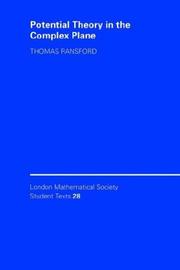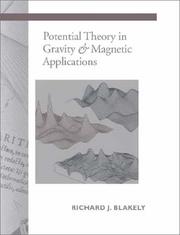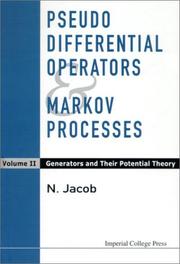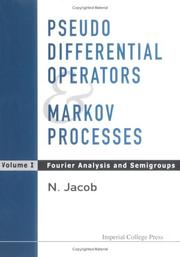| Listing 1 - 10 of 15 | << page >> |
Sort by
|

ISBN: 1316087166 1107366968 1107362059 0511944683 0511623771 1299409075 1107364507 9781107362055 9781107366961 9780511623776 0521461200 9780521461207 0521466547 9780521466547 Year: 1995 Volume: 28 Publisher: Cambridge: Cambridge university press,
Abstract | Keywords | Export | Availability | Bookmark
 Loading...
Loading...Choose an application
- Reference Manager
- EndNote
- RefWorks (Direct export to RefWorks)
Potential theory is the broad area of mathematical analysis encompassing such topics as harmonic and subharmonic functions, the Dirichlet problem, harmonic measure, Green's functions, potentials and capacity. This is an introduction to the subject suitable for beginning graduate students, concentrating on the important case of two dimensions. This permits a simpler treatment than other books, yet is still sufficient for a wide range of applications to complex analysis; these include Picard's theorem, the Phragmén-Lindelöf principle, the Koebe one-quarter mapping theorem and a sharp quantitative form of Runge's theorem. In addition there is a chapter on connections with functional analysis and dynamical systems, which shows how the theory can be applied to other parts of mathematics, and gives a flavour of some recent research. Exercises are provided throughout, enabling the book to be used with advanced courses on complex analysis or potential theory.
Potential theory (Mathematics) --- Functions of complex variables. --- Complex variables --- Elliptic functions --- Functions of real variables --- Green's operators --- Green's theorem --- Potential functions (Mathematics) --- Potential, Theory of --- Mathematical analysis --- Mechanics --- Functions of complex variables --- Functions (Mathematics)

ISBN: 1281793183 9786611793180 008087262X 0444703861 9780444703866 9780080872629 Year: 1988 Publisher: Amsterdam New York Elsevier
Abstract | Keywords | Export | Availability | Bookmark
 Loading...
Loading...Choose an application
- Reference Manager
- EndNote
- RefWorks (Direct export to RefWorks)
This third volume of the monograph examines potential theory. The first chapter develops potential theory with respect to a single kernel (or discrete time semigroup). All the essential ideas of the theory are presented: excessive functions, reductions, sweeping, maximum principle. The second chapter begins with a study of the notion of reduction in the most general situation possible - the ``gambling house'' of Dubins and Savage. The beautiful results presented have never been made accessible to a wide public. These are then connected with the theory of sweeping with respect to a cone of cont
Probabilities. --- Potential theory (Mathematics) --- Semigroups. --- Group theory --- Green's operators --- Green's theorem --- Potential functions (Mathematics) --- Potential, Theory of --- Mathematical analysis --- Mechanics --- Probability --- Statistical inference --- Combinations --- Mathematics --- Chance --- Least squares --- Mathematical statistics --- Risk

ISBN: 0511880324 1316174921 1316170594 0521575478 1316176134 1316173828 0511954387 1316178005 1615832238 0511549814 9781615832231 052141508X 9780521415088 9781316178003 9780521575478 9780511549816 Year: 1996 Publisher: Cambridge [England] ; New York : Cambridge University Press,
Abstract | Keywords | Export | Availability | Bookmark
 Loading...
Loading...Choose an application
- Reference Manager
- EndNote
- RefWorks (Direct export to RefWorks)
This text bridges the gap between the classic texts on potential theory and modern books on applied geophysics. It opens with an introduction to potential theory, emphasising those aspects particularly important to earth scientists, such as Laplace's equation, Newtonian potential, magnetic and electrostatic fields, and conduction of heat. The theory is then applied to the interpretation of gravity and magnetic anomalies, drawing on examples from modern geophysical literature. Topics explored include regional and global fields, forward modeling, inverse methods, depth-to-source estimation, ideal bodies, analytical continuation, and spectral analysis. The book includes numerous exercises and a variety of computer subroutines written in FORTRAN. Graduate students and researchers in geophysics will find this book essential.
Geophysics --- Potential theory (Mathematics) --- Green's operators --- Green's theorem --- Potential functions (Mathematics) --- Potential, Theory of --- Mathematical analysis --- Mechanics --- Geological physics --- Terrestrial physics --- Earth sciences --- Physics --- Technique. --- 550.3 --- 550.3 Geophysics

ISBN: 1860949568 9781860949562 9781860943249 9781860949562 1860943241 Year: 2002 Publisher: London Imperial College Press
Abstract | Keywords | Export | Availability | Bookmark
 Loading...
Loading...Choose an application
- Reference Manager
- EndNote
- RefWorks (Direct export to RefWorks)
In this volume two topics are discussed: the construction of Feller and Lp-sub-Markovian semigroups by starting with a pseudo-differential operator, and the potential theory of these semigroups and their generators. The first part of the text essentially discusses the analysis of pseudo-differential operators with negative definite symbols and develops a symbolic calculus; in addition, it deals with special approaches, such as subordination in the sense of Bochner. The second part handles capacities, function spaces associated with continuous negative definite functions, Lp -sub-Markovian sem
Semigroups of operators. --- Pseudodifferential operators. --- Potential theory (Mathematics) --- Green's operators --- Green's theorem --- Potential functions (Mathematics) --- Potential, Theory of --- Mathematical analysis --- Mechanics --- Operators, Pseudodifferential --- Pseudo-differential operators --- Operator theory --- Operators, Semigroups of
Book
ISBN: 1316674223 1316674401 1316674762 1316675300 1316674940 1316562859 9781316562857 9781316675304 9781107148055 1107148057 Year: 2016 Publisher: Cambridge : Cambridge University Press,
Abstract | Keywords | Export | Availability | Bookmark
 Loading...
Loading...Choose an application
- Reference Manager
- EndNote
- RefWorks (Direct export to RefWorks)
Noncommutative mathematics is a significant new trend of mathematics. Initially motivated by the development of quantum physics, the idea of 'making theory noncommutative' has been extended to many areas of pure and applied mathematics. This book is divided into two parts. The first part provides an introduction to quantum probability, focusing on the notion of independence in quantum probability and on the theory of quantum stochastic processes with independent and stationary increments. The second part provides an introduction to quantum dynamical systems, discussing analogies with fundamental problems studied in classical dynamics. The desire to build an extension of the classical theory provides new, original ways to understand well-known 'commutative' results. On the other hand the richness of the quantum mathematical world presents completely novel phenomena, never encountered in the classical setting. This book will be useful to students and researchers in noncommutative probability, mathematical physics and operator algebras.
Probabilities. --- Quantum theory. --- Potential theory (Mathematics) --- Green's operators --- Green's theorem --- Potential functions (Mathematics) --- Potential, Theory of --- Mathematical analysis --- Mechanics --- Quantum dynamics --- Quantum mechanics --- Quantum physics --- Physics --- Thermodynamics --- Probability --- Statistical inference --- Combinations --- Mathematics --- Chance --- Least squares --- Mathematical statistics --- Risk
Periodical
Abstract | Keywords | Export | Availability | Bookmark
 Loading...
Loading...Choose an application
- Reference Manager
- EndNote
- RefWorks (Direct export to RefWorks)
Potential theory (Mathematics) --- Functional analysis --- Probabilities --- Geometry --- Potentiel, Théorie du --- Analyse fonctionnelle --- Probabilités --- Géométrie --- Functional calculus --- Green's operators --- Green's theorem --- Potential functions (Mathematics) --- Potential, Theory of --- Calculus of variations --- Functional equations --- Integral equations --- Mathematical analysis --- Mechanics --- Mathematical Sciences --- Applied Mathematics --- General and Others

ISBN: 1281866911 9786611866914 1860947158 9781860947155 1860942938 9781860942938 1860943241 9781860943249 1860945686 9781860945687 Year: 2001 Publisher: Londen Imperial College Press
Abstract | Keywords | Export | Availability | Bookmark
 Loading...
Loading...Choose an application
- Reference Manager
- EndNote
- RefWorks (Direct export to RefWorks)
This volume concentrates on how to construct a Markov process by starting with a suitable pseudo-differential operator. Feller processes, Hunt processes associated with Lp-sub-Markovian semigroups and processes constructed by using the Martingale problem are at the center of the considerations. The potential theory of these processes is further developed and applications are discussed. Due to the non-locality of the generators, the processes are jump processes and their relations to Levy processes are investigated. Special emphasis is given to the symbol of a process, a notion which generalize
Markov processes. --- Pseudodifferential operators. --- Potential theory (Mathematics) --- Green's operators --- Green's theorem --- Potential functions (Mathematics) --- Potential, Theory of --- Mathematical analysis --- Mechanics --- Operators, Pseudodifferential --- Pseudo-differential operators --- Operator theory --- Analysis, Markov --- Chains, Markov --- Markoff processes --- Markov analysis --- Markov chains --- Markov models --- Models, Markov --- Processes, Markov --- Stochastic processes --- Harmonic analysis. Fourier analysis
Book
ISBN: 9783031219528 Year: 2023 Publisher: Cham, Switzerland : Springer Nature Switzerland AG,
Abstract | Keywords | Export | Availability | Bookmark
 Loading...
Loading...Choose an application
- Reference Manager
- EndNote
- RefWorks (Direct export to RefWorks)
The book The E. M. Stein Lectures on Hardy Spaces is based on a graduate course on real variable Hardy spaces which was given by E.M. Stein at Princeton University in the academic year 1973-1974. Stein, along with C. Fefferman and G. Weiss, pioneered this subject area, removing the theory of Hardy spaces from its traditional dependence on complex variables, and to reveal its real-variable underpinnings. This book is based on Steven G. Krantz’s notes from the course given by Stein. The text builds on Fefferman's theorem that BMO is the dual of the Hardy space. Using maximal functions, singular integrals, and related ideas, Stein offers many new characterizations of the Hardy spaces. The result is a rich tapestry of ideas that develops the theory of singular integrals to a new level. The final chapter describes the major developments since 1974. This monograph is of broad interest to graduate students and researchers in mathematical analysis. Prerequisites for the book include a solid understanding of real variable theory and complex variable theory. A basic knowledge of functional analysis would also be useful.
Fourier analysis. --- Potential theory (Mathematics). --- Fourier Analysis. --- Potential Theory. --- Green's operators --- Green's theorem --- Potential functions (Mathematics) --- Potential, Theory of --- Mathematical analysis --- Mechanics --- Analysis, Fourier --- Bounded mean oscillation. --- Hardy spaces. --- Stein, Elias M., --- Spaces, Hardy --- Functional analysis --- Functions of complex variables --- BMO (Mathematics) --- Function spaces --- Stein, E. M. --- Steĭn, Ilaĭes M., --- Стейн, Илайес М., --- Espais de Hardy --- Espais funcionals

ISBN: 9780720407013 072040701X 9786611777586 1281777587 0080871402 9781281777584 661177758X 9780080871400 Year: 1978 Volume: 29 Publisher: Paris Amsterdam New York New York Hermann North-Holland Pub. Co. Sole distributors for the U.S.A. and Canada, Elsevier North-Holland
Abstract | Keywords | Export | Availability | Bookmark
 Loading...
Loading...Choose an application
- Reference Manager
- EndNote
- RefWorks (Direct export to RefWorks)
Probabilities. --- Measure theory. --- Potential theory (Mathematics) --- Martingales (Mathematics) --- Probabilités --- Mesure, Théorie de la --- Potentiel, Théorie du --- Martingales (Mathématiques) --- Probabilities --- Measure theory --- Potential, Theory of --- 519.21 --- Probability --- Statistical inference --- Combinations --- Mathematics --- Chance --- Least squares --- Mathematical statistics --- Risk --- Green's operators --- Green's theorem --- Potential functions (Mathematics) --- Mathematical analysis --- Mechanics --- Lebesgue measure --- Measurable sets --- Measure of a set --- Algebraic topology --- Integrals, Generalized --- Measure algebras --- Rings (Algebra) --- Stochastic processes --- Probability theory. Stochastic processes --- Martingales (Mathematics). --- Potential theory (Mathematics). --- 519.21 Probability theory. Stochastic processes
Book
ISBN: 1282714368 9786612714368 3110203219 9783110203219 9783110203202 3110203200 Year: 2009 Publisher: Berlin Boston
Abstract | Keywords | Export | Availability | Bookmark
 Loading...
Loading...Choose an application
- Reference Manager
- EndNote
- RefWorks (Direct export to RefWorks)
This monograph presents the state of the art of convexity, with an emphasis to integral representation. The exposition is focused on Choquet's theory of function spaces with a link to compact convex sets. An important feature of the book is an interplay between various mathematical subjects, such as functional analysis, measure theory, descriptive set theory, Banach spaces theory and potential theory. A substantial part of the material is of fairly recent origin and many results appear in the book form for the first time. The text is self-contained and covers a wide range of applications. From the contents: Geometry of convex sets Choquet theory of function spaces Affine functions on compact convex sets Perfect classes of functions and representation of affine functions Simplicial function spaces Choquet's theory of function cones Topologies on boundaries Several results on function spaces and compact convex sets Continuous and measurable selectors Construction of function spaces Function spaces in potential theory and Dirichlet problem Applications
Functional analysis. --- Convex domains. --- Banach spaces. --- Potential theory (Mathematics) --- Integral representations. --- Representations, Integral --- Algebraic number theory --- Crystallography, Mathematical --- Representations of groups --- Green's operators --- Green's theorem --- Potential functions (Mathematics) --- Potential, Theory of --- Mathematical analysis --- Mechanics --- Functions of complex variables --- Generalized spaces --- Topology --- Convex regions --- Convexity --- Calculus of variations --- Convex geometry --- Point set theory --- Functional calculus --- Functional equations --- Integral equations --- Convex Analysis. --- Dirichlet Problem. --- Functional Analysis. --- Partial Differential Equation. --- Potential Theory. --- Functional analysis --- Convex domains --- Banach spaces --- Integral representations
| Listing 1 - 10 of 15 | << page >> |
Sort by
|

 Search
Search Feedback
Feedback About UniCat
About UniCat  Help
Help News
News